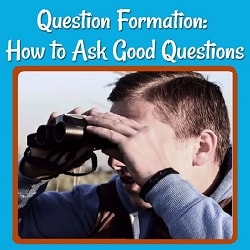The Simple Past Tense of Regular Verbs
The simple past tense of regular verbs in English is not complicated or hard to learn. We form it by adding 'ed’ (or ‘d’ if the verb ends in ‘e’) to the end of the base form* of a verb.
Except for the verb ‘be,’ verbs are not conjugated in the past tense. (That means the end of the verb doesn't change depending on who it's talking about.) We use the same simple form for every person, singular or plural.
*(The base form of a verb is usually the present tense for plurals, I, or you. It doesn't end in 's' like the 3rd person singular.)
So ‘live’ in the past is ‘lived,’ ‘arrive’ is ‘arrived,’ ’like’ is ‘liked,’ ‘walk’ is ‘walked,’ and ‘play’ is ‘played.’
"Before I married, I lived in central California, but one brother lived in Oregon. Another brother and sister lived on the coast. We all liked to get together, so we visited each other when we could."
Spelling Changes in the Simple Past Tense
If a verb ends in a consonant and then ‘y’, the ‘y’ changes to ‘i’
(same sound) before adding the ‘ed.’ So ‘study’ becomes ‘studied.’
‘Carry’ becomes ‘carried,’ ‘cry’ and ‘try’ become ‘cried’ and ‘tried.’
There is one more common spelling change from the present to the regular past. For most regular verbs we keep the same vowed sound in the past tense as the present. (This is NOT true for many irregular pasts!)
So verbs that end in a silent ‘e’ will add a ‘d’ and still be pronounced with a long vowel in the past. Examples:
- hope becomes hoped,
- mope (acting sad) becomes moped,
- pine (longing for) becomes pined,
- plane (smoothing wood with a tool called a plane) becomes planed,
- robe (to put a robe on someone) becomes robed, and
- tape
(fastening with tape) becomes taped.
These pasts could easily be confused with the past tense forms of: hop, mop, plan, pin, rob, or tap. This second group of verbs end in a vowel and one consonant, causing that vowel to be “short.” If we just added ‘ed’ to them, they would look just like the “silent ‘e’” verbs above.
So we need to show which word we mean. By doubling the ending consonant of verbs like these when we add ‘ed,’ we keep these vowels short. That shows the difference between the two similar words. So the rule is: If you have a verb ending with a single vowel and then a single consonant, double the consonant before adding ‘ed’ for a regular past tense verb.
Examples:
- hop (jump on one leg) > hopped,
- mop (wash the floor) > mopped,
- pin > pinned,
- plan > planned,
- rob > robbed,
- tap > tapped,
- as well as cram > crammed,
- hug > hugged,
- and stop > stopped.
Pronouncing 'ed'
We do not normally add an extra syllable when we change a verb to the past tense. It’s easy to add a ‘d’ sound after a verb ending with a vowel or voiced consonant sound, like play or call.
However, if you try to pronounce a pure ‘d’ after an unvoiced ending sound, such as in ‘cook’ or ‘hope,’ you will add a syllable : cook-ed or hope-ed. (It's not possible to pronounce a pure 'd' sound in the same syllable.) So with unvoiced endings. we pronounce the ‘ed’ with a ‘t’ sound.
(You don’t need to TRY to make a ‘t’ sound. If you try to make a ‘d’ sound in the same syllable it will automatically sound like ‘t’ after an unvoiced ‘ch,’ ‘f,’ ‘k,’ ‘p,’ ‘s’, ‘sh’, or ‘x.’ As a native English speaker, I never even noticed that I was ending those words with a 't' sound. It just comes out that way!)
In words that already end with a ‘d’ or
‘t’ sound we DO add an extra syllable (pronounced ‘id.’) Otherwise, we could not hear the difference between the past and the
present tense of those words. So we pronounce such words need-ed, want-ed, pro-vid-ed.
Ending sound pronounced ‘d’: believed, called, cared, loved, seemed, tried, turned, used.
Ending sound pronounced ‘t’: asked, brushed, coughed, fixed, guessed, helped, looked, talked, watched, worked.
End with a ‘d’ or ‘t’ sound:-- add another syllable (sound of ‘id’) : acted, ended, hated, needed, provided, rotted, started, wanted.
For more on the relationship between spelling and pronunciation of these words, see English Vowels.
Negatives & Questions in the Simple Past
Negatives and questions are formed the same way in the simple past as in the present. They usually use ‘did’ (the past tense of the verb ‘to do’) or another helping verb like ‘could’ (past tense of ‘can.’) As in the present, the main verb will be in its base form, not its past form.
Examples:
- Jim finished his essay at the last minute. Did Sue finish hers? No, she didn’t finish it in time.
- Did you help Sue with her essay? No. I couldn’t help her. Anyway, she didn’t ask for help.
- Mary worked at Washington High School from 2006 to 2011. Did you work with her there? No, I didn’t start working there until 2014.
Irregular Past Tense Verbs
Even
with these minor complications of spelling and pronunciation, the
simple past tense in English is not difficult to learn. The difficulty
is in remembering the many irregular verbs. Don’t let them scare you!
Go to
Irregular Verbs and the practice pages mentioned there.
Learn the most common 20 (just one past and one participle form
each) for a good start on using the past tense in English. Whenever you
can, study another list. Once you learn them all
(only about 65 more verbs), you will have all the forms you need to
speak and write confidently in the simple past tense.
home> English Verb Tenses > Simple Past Tense.
Didn't find what you
needed? Explain what you want in the search box below.
(For example, cognates, past tense practice, or 'get along with.') Click to see the related pages on EnglishHints.
| site search by freefind | advanced |











